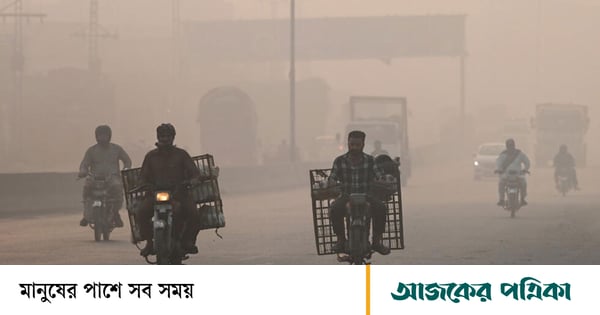Relations between nuclear-armed neighbors Pakistan and India have long been strained and tense. But now an unexpected 'cause' has emerged that could create an opportunity for the two countries to start talks to advance the stagnant relationship. And this is the deadly 'smog' – which has largely covered important cities in both countries.
Chief Minister Maryam Nawaz has expressed interest in visiting the country to work with India's Punjab province to tackle the severe air pollution problem, a senior government official in Pakistan's most populous province of Punjab said. Recently, Lahore and India's capital Delhi topped the list of the world's most polluted cities.
Raja Jahangir Anwar, secretary for environment and climate change in Pakistan's Punjab province, told Al-Jazeera, the Qatar-based media outlet, that Chief Minister Maryam Nawaz will soon send a letter to the Chief Minister of Indian Punjab (Bhagwant Singh Mann). He expressed his desire to visit India and also invited him to visit Pakistan.
Anwar also said, 'Due to adverse climate conditions in the region, Pakistan is considering organizing a regional climate conference in Lahore later this year. We recognize that these matters are matters of foreign policy. For which approval of central government and concerned stakeholders is required. But this situation is very important. If it can bring Pakistan, India and other countries together, why waste this opportunity?'
Since last September, air quality in Lahore and New Delhi has seriously deteriorated due to low temperatures, changing atmospheric conditions and heavy smog emissions. Amid this rising air pollution, Maryam recently reiterated her commitment to pursue 'climate diplomacy', favoring normalization of relations with India.
Addressing a Diwali event in Lahore on Wednesday, Maryam Nawaz emphasized the need for cooperation between both India and Pakistan in this regard. He said, 'This issue should be resolved diplomatically with India. I am thinking of writing a letter to the Chief Minister of Indian Punjab. This is not a political, but a human issue.'
Maryam Nawaz, daughter of Pakistan's former Prime Minister Nawaz Sharif, also said that her government is taking steps to deal with the crisis. But complementary steps are essential from India's side as well. He said, 'The air does not know that there is a border here. This needs to be done both for the good health of the people of India and the welfare of the people of Pakistan.'
Dawar Hamid Butt, assistant director of the Pakistan Air Quality Initiative, said the chief minister's proposal to engage with Indian leaders indicated the need for a transboundary pollution management approach. He said, 'The Malay Declaration was intended to develop such a system among South Asian countries, but it did not succeed. Recent efforts are underway to revive it. But the matter is still uncertain.'
The Male Declaration is the only existing intergovernmental framework to combat air pollution in South Asia. Bangladesh, Bhutan, India, Iran, Maldives, Nepal, Pakistan and Sri Lanka jointly signed this declaration in 1998.
According to an IQAir report released in April 2023, South Asia is the most severely polluted region in the world. Bangladesh, Pakistan and India had the worst air quality last year. A recent study by the UK-based medical journal Lancet reported that 1.6 million people died in India in 2021 due to air pollution.
Hamid Butt said, 'The solution is very clear, although it is not very easy to implement for developing countries. However, both India and Pakistan need to find clean energy sources in all sectors and adopt effective crop waste management measures.

